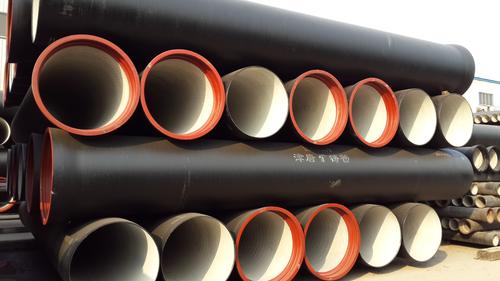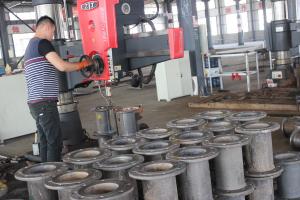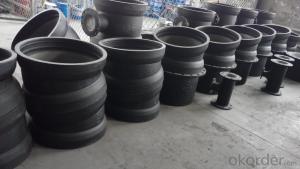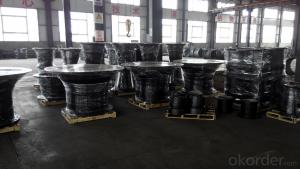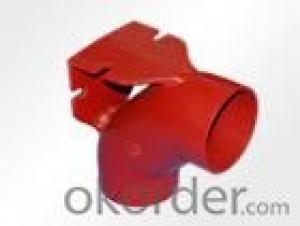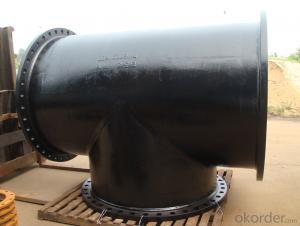ductile iron pipe
- Loading Port:
- China Main Port
- Payment Terms:
- TT OR LC
- Min Order Qty:
- -
- Supply Capability:
- -
OKorder Service Pledge
OKorder Financial Service
You Might Also Like
1) The standard of pipe: ISO2531:1998, EN545:2006,K9 K8
2) Effective length: 6m/5.7m
3) Inner cement line: Portland cement lineas per ISO4179
4) Zinc coating: at least 130g/m2 as per ISO8179
5) Bitumen painting: at least 70μm as per ISO8179
6)With 102% quantity of NBR, SBR, or EPDM ring asper ISO4633
7) DN80-DN1200
8) Highstrength, lighter than grey iron, good corrosion resistance, no furring, smallflow resistance, easy fixing, long life tome about 100 yeas
9)Checked by automatic inspection equipment
10) Composition:
Chemical composition | |||
Chemical composition | Ductile Cast Iron Pipe (%) | Grey iron pipe (%) | Steel pipe (%) |
C | 3.5-4.0 | 3.2-3.8 | 0.1-0.2 |
Si | 1.9-2.6 | 1.4-2.2 | 0.15-0.4 |
Mn | 0.15-0.45 | 0.4-0.6 | 0.3-0.6 |
P | ≤0.06 | ≤0.3 | 0.02-0.03 |
S | ≤0.02 | ≤0.1 | 0.02-0.03 |
Mg | 0.03-0.06 |
|
|
11) Feature:
Mechanical properties | |||
| Ductile Cast Iron Pipe | Grey Iron Pipe | Steel Pipe |
Tensile Strength(Mpa) | ≥420 | 150-260 | ≥400 |
Yield Strength(Mpa) | ≥300 | No Confirmation | No Confirmation |
Bending Strength(Mpa) | ≥590 | 200-360 | ≥400 |
Elongation (%) | ≥10 | Neglected | ≥18 |
Brinell Hardness(HBS) | ≤230 | ≤230 | About 140 |
12) T type mechanical joint
13) Packing: in bulk or container
PACKING: 1) Pipesare bundled together with the steel belt.
2) Wooden pieces are put between the pipes.
- Q: How does ductile iron pipe perform in high-temperature environments?
- Due to its unique properties and characteristics, ductile iron pipe performs exceptionally well in high-temperature environments. It is known for its high strength, toughness, and durability, making it suitable for various applications that involve elevated temperatures. One of the main advantages of ductile iron pipe in high-temperature environments is its ability to withstand thermal expansion and contraction. With a low coefficient of thermal expansion, the material can handle significant temperature fluctuations without suffering detrimental effects. This ensures that the pipe remains structurally stable, avoiding deformation or cracking when exposed to high temperatures. Moreover, ductile iron pipe exhibits excellent thermal conductivity, allowing it to efficiently transfer heat. This prevents the accumulation of excessive heat and reduces the risk of thermal stress. Additionally, its high thermal conductivity enables it to dissipate heat quickly, ensuring that the pipe remains within safe operating temperatures. Furthermore, ductile iron pipe has a high melting point of approximately 2200°F (1200°C). This characteristic guarantees that the pipe maintains its structural integrity even in extremely high-temperature environments, making it capable of effectively handling hot fluids, steam, and other substances at elevated temperatures without compromising performance. Another crucial aspect is the corrosion resistance of ductile iron pipe. It is commonly coated with protective linings, such as cement mortar or epoxy, which act as a barrier against corrosion caused by high temperatures. These linings prevent direct contact between the pipe and corrosive substances, thereby ensuring the pipe's longevity in high-temperature environments. In conclusion, ductile iron pipe is an excellent choice for high-temperature environments due to its exceptional strength, thermal stability, thermal conductivity, and corrosion resistance. Its ability to withstand thermal expansion, high melting point, and efficient heat transfer properties make it a reliable and durable option for various applications in such conditions.
- Q: Are ductile iron pipes suitable for mining applications?
- Yes, ductile iron pipes are suitable for mining applications. Ductile iron pipes are known for their strength, durability, and resistance to corrosion, making them ideal for underground mining operations. They can withstand high pressure, heavy loads, and abrasive materials commonly found in mining environments. Additionally, their flexible nature allows for easy installation and maintenance in challenging mining conditions.
- Q: Can ductile iron pipes be used in areas with high soil salinity?
- Yes, ductile iron pipes can be used in areas with high soil salinity. Ductile iron pipes are known for their high corrosion resistance, making them suitable for various soil conditions, including those with high salinity levels. The pipes are typically coated with a protective layer, such as polyethylene or zinc, which further enhances their resistance to corrosion from saltwater or saline soils. Additionally, proper installation techniques, such as proper backfilling and compacting of the soil around the pipes, can help minimize the potential impact of high soil salinity on the performance and longevity of ductile iron pipes.
- Q: What are the different types of restrained joints for ductile iron pipe?
- Some of the different types of restrained joints for ductile iron pipe include mechanical joints, push-on joints, and restrained push-on joints. Mechanical joints use bolts and gaskets to create a tight seal, while push-on joints rely on a rubber gasket to provide a secure connection. Restrained push-on joints incorporate additional features such as external restraints or wedges to prevent pipe movement.
- Q: Does the cast iron pipe need separate corrosion protection?
- Ductile iron is characterized by its ease of decay and deformation, so if it is not a particular requirement, there is no need to do it alone
- Q: How can the ductile iron pipes be treated with corrosion protection?
- Cement mortar lining + special coatingThe internal corrosion prevention measures are suitable for pipes conveying sewage, and the corrosion resistance of lining can be improved.
- Q: Can ductile iron pipes be used for underground drainage systems?
- Yes, ductile iron pipes can be used for underground drainage systems. Ductile iron pipes have high tensile strength and durability, making them suitable for withstanding the external pressures and loads associated with underground applications. They are also resistant to corrosion and have a long lifespan, making them a reliable choice for drainage systems.
- Q: Can ductile iron pipes be used for rainwater harvesting systems?
- Certainly, rainwater harvesting systems can utilize ductile iron pipes. Renowned for their robustness and resilience, ductile iron pipes prove to be fitting for a range of purposes, including rainwater harvesting. These pipes exhibit exceptional resistance to corrosion and are capable of withstanding considerable pressure, thereby ensuring the efficient conveyance of rainwater from the point of collection to storage tanks or distribution networks. Moreover, their impressively long lifespan diminishes the necessity for frequent replacements, rendering them a cost-effective option for rainwater harvesting systems.
- Q: Can ductile iron pipes be used for underground chemical transport systems?
- Due to their strength, durability, and resistance to corrosion, ductile iron pipes are commonly utilized in a variety of applications. However, when considering their use in underground chemical transport systems, it is crucial to take certain factors into account. Firstly, it is necessary to evaluate the type of chemicals being transported. Although ductile iron pipes are generally resistant to a wide range of chemicals, including acids, alkalis, and organic solvents, there are some chemicals that can cause corrosion or react with the iron content of the pipes, leading to degradation and potential leakage. Therefore, it is essential to assess chemical compatibility and seek advice from chemical engineers or experts to determine if ductile iron pipes are suitable for specific chemical transport applications. Secondly, the concentration and temperature of the chemicals must be considered. Elevated temperatures and high concentrations of certain chemicals can accelerate the corrosion process, potentially compromising the integrity of the pipes. Therefore, it is crucial to evaluate the operating conditions and ensure that the ductile iron pipes can withstand the chemical concentration and temperature levels. Furthermore, the potential presence of abrasive or erosive chemicals needs to be taken into consideration. If the transported chemicals contain abrasive particles or possess erosive properties, it may cause increased wear and tear on the inner surface of the pipes, reducing their lifespan and potentially leading to leaks. In such cases, it may be more appropriate to use alternative materials with higher resistance to abrasion or erosion. Lastly, it is important to adhere to relevant regulations and standards. Different countries or regions may have specific requirements for underground chemical transport systems, including the selection of materials. Therefore, it is crucial to ensure that ductile iron pipes meet the necessary standards and are approved for use in such applications. In conclusion, while ductile iron pipes have many desirable properties for various applications, including underground use, their suitability for chemical transport systems is dependent on several factors. Before deciding to use ductile iron pipes for underground chemical transport systems, it is essential to carefully evaluate chemical compatibility, concentration and temperature levels, the presence of abrasive or erosive chemicals, and compliance with regulations. Seeking guidance from experts in the field is highly recommended to ensure the safety and effectiveness of the chosen piping material.
- Q: Can ductile iron pipes be used for underground river crossings?
- Yes, ductile iron pipes can be used for underground river crossings. Ductile iron pipes have excellent strength and durability, making them suitable for various applications, including underground river crossings. They have high tensile strength and are resistant to corrosion and external loads, making them an ideal choice for such installations.
Send your message to us
ductile iron pipe
- Loading Port:
- China Main Port
- Payment Terms:
- TT OR LC
- Min Order Qty:
- -
- Supply Capability:
- -
OKorder Service Pledge
OKorder Financial Service
Similar products
Hot products
Hot Searches
Related keywords

